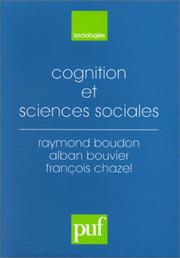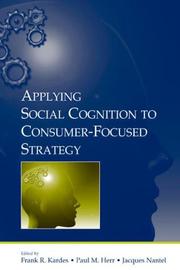| Listing 1 - 10 of 14 | << page >> |
Sort by
|

ISSN: 0154215X ISBN: 213047893X 9782130478935 Year: 1997 Volume: *18 Publisher: Paris: PUF,
Abstract | Keywords | Export | Availability | Bookmark
 Loading...
Loading...Choose an application
- Reference Manager
- EndNote
- RefWorks (Direct export to RefWorks)
Social psychology --- Cognition --- Social sciences --- Sciences sociales --- Social aspects --- Methodology --- Social aspects. --- Methodology. --- Public opinion --- Congresses --- Social perception --- Cognition - Social aspects --- Social sciences - Methodology
Book
ISBN: 9782130562504 2130562507 Year: 2007 Publisher: Paris: PUF,
Abstract | Keywords | Export | Availability | Bookmark
 Loading...
Loading...Choose an application
- Reference Manager
- EndNote
- RefWorks (Direct export to RefWorks)
Pourquoi l'homme se trompe-t-il aussi souvent ? Quelles sont les voies qui le conduisent à croire qu'il a raison alors même qu'il s'égare ? Pourquoi nos intuitions nous font-elles parfois prendre des vessies pour des lanternes ? Certaines de nos erreurs sont fascinantes parce qu'elles sont universelles, récurrentes et, d'une certaine façon, prévisibles. L'existence de ce type d'erreurs implique-t-il que nous pensions comme des ordinateurs programmés pour se fourvoyer ? C'est à ces questions que ce livre se propose de répondre en présentant de façon claire les recherches les plus contemporaines sur ce point. L'énigme de l'erreur est d'autant plus obsédante pour qui veut comprendre le fonctionnement de notre vie collective, qu'elle a des conséquences sociales incalculables : c'est ce que montre l'ouvrage en mobilisant un grand nombre d'exemples, parfois amusants, parfois dramatiques.
Sociological theory building --- Knowledge, Sociology of --- Sociologie de la connaissance --- Cognition --- Error --- Social aspects --- Error. --- Knowledge, Sociology of. --- Social aspects. --- Sociology --- Human error --- Cognition - Social aspects

ISBN: 0805855203 9780805855203 Year: 2005 Publisher: Mahwah (N.J.): Lawrence Erlbaum,
Abstract | Keywords | Export | Availability | Bookmark
 Loading...
Loading...Choose an application
- Reference Manager
- EndNote
- RefWorks (Direct export to RefWorks)
'Applying Social Cognition to Consumer-Focused Strategy,' a book in the Advertising and Consumer Psychology series sponsored by the Society for Consumer Psychology, focuses on the most important recent developments at the interface of social cognition and marketing, and develops integrative theoretical frameworks with rich practical implications. More specifically, the chapters offer a novel and thought-provoking perspective on consumer-focused strategy--or the effects of marketing stimuli and activities on an integrated system of consumer processes and responses. Divided into four parts, this book: *offers new perspectives on consumer information processing, selective or one sided information processing, and attribution theory; *discusses how asking questions in focus groups, surveys, and experiments leads consumers to create opinions that would not have occurred to them otherwise; *advances a new approach for modeling uncertainty and a new framework for thinking about uncertainty; *summarizes recent developments concerning the Implicit Association Test and their implications for branding strategy; *develops a new approach for analyzing the effects of intention on behavior and unplanned purchase behaviors; *discusses the devaluation effect and shows both how implementation intentions can be used to increase new product consumption and also how promotion versus prevention regulatory focus influences consumer preferences; and *focuses on consumer information processing and persuasion. The text is intended for advanced graduate students, academics, and practitioners who embrace cutting-edge paradigms and methodologies in social-cognitive consumer research.
Consumer behavior --- Marketing --- Advertising --- Cognition --- Psychological aspects --- Social aspects --- Consumer behavior - Congresses --- Marketing - Psychological aspects - Congresses --- Advertising - Psychological aspects - Congresses --- Cognition - Social aspects - Congresses --- Consumentengedrag.
Book
ISBN: 2200211678 9782200211677 Year: 1993 Publisher: Paris: Armand Colin,
Abstract | Keywords | Export | Availability | Bookmark
 Loading...
Loading...Choose an application
- Reference Manager
- EndNote
- RefWorks (Direct export to RefWorks)
Autobiography --- Cognition --- Self --- Self-knowledge, Theory of --- Autobiographie --- Moi (Psychologie) --- Connaissance de soi --- Psychological aspects --- Social aspects --- Aspect psychologique --- Aspect social --- Psychological aspects. --- Self - Social aspects --- Cognition - Social aspects --- Autobiography - Psychological aspects
Book
ISBN: 9782914610414 2914610416 Year: 2008 Publisher: Paris: Archives contemporaines,
Abstract | Keywords | Export | Availability | Bookmark
 Loading...
Loading...Choose an application
- Reference Manager
- EndNote
- RefWorks (Direct export to RefWorks)
Cognition --- Social sciences and psychology --- Sciences sociales et psychologie --- Social aspects --- Social sciences --- Cognition - Social aspects --- Sociologie et sciences cognitives --- Interdisciplinarité dans les sciences sociales --- Interdisciplinarité dans les sciences humaines --- Sciences humaines --- Recherche --- Méthodologie
Book
ISBN: 3261040378 9783261040374 Year: 1991 Publisher: Berne: Lang,
Abstract | Keywords | Export | Availability | Bookmark
 Loading...
Loading...Choose an application
- Reference Manager
- EndNote
- RefWorks (Direct export to RefWorks)
Cognition and culture --- Intellect --- Cognition in children --- Cognition et culture --- Intelligence --- Cognition chez l'enfant --- Social aspects --- Aspect social --- social behaviour --- Cognition --- Psychology --- Teaching --- Children --- Teaching methods --- Cognition - Social aspects --- Psychopedagogie --- Retro-action
Book
ISBN: 9782130796152 213079615X Year: 2018 Publisher: Paris: PUF,
Abstract | Keywords | Export | Availability | Bookmark
 Loading...
Loading...Choose an application
- Reference Manager
- EndNote
- RefWorks (Direct export to RefWorks)
Comment comprendre les métamorphoses et les formes actuelles de la croyance ? Pourquoi certaines croyances se diffusent-elles rapidement dans l'opinion publique et d'autres non ? Quels sont les contextes sociaux qui favorisent l'émergence des croyances ? Ce livre propose plusieurs réponses à partir de divers exemples décrivant les logiques qui sous-tendent nos adhésions cognitives et les phénomènes collectifs qui les favorisent. L'ouvrage théorise également l'idée que l'empire des croyances se distingue en grande partie de la déraison.
Cognition --- Croyance (psychologie) --- Croyances populaires --- Sociologie de la connaissance --- Aspect social --- Knowledge, Sociology of --- Belief and doubt --- Superstition --- Social aspects --- Croyances populaires. --- Sociologie de la connaissance. --- Aspect social. --- Cognition - Social aspects --- Social psychology --- Rationalism
Book

ISBN: 9780674724778 0674724771 9780674726369 9780674986831 0674726367 0674727568 9780674727564 Year: 2014 Publisher: Cambridge, Massachusetts ; London, England : Harvard University Press,
Abstract | Keywords | Export | Availability | Bookmark
 Loading...
Loading...Choose an application
- Reference Manager
- EndNote
- RefWorks (Direct export to RefWorks)
Tool-making or culture, language or religious belief: ever since Darwin, thinkers have struggled to identify what fundamentally differentiates human beings from other animals. Michael Tomasello weaves his twenty years of comparative studies of humans and great apes into a compelling argument that cooperative social interaction is the key to our cognitive uniqueness. Tomasello maintains that our prehuman ancestors, like today's great apes, were social beings who could solve problems by thinking. But they were almost entirely competitive, aiming only at their individual goals. As ecological changes forced them into more cooperative living arrangements, early humans had to coordinate their actions and communicate their thoughts with collaborative partners. Tomasello's "shared intentionality hypothesis" captures how these more socially complex forms of life led to more conceptually complex forms of thinking. In order to survive, humans had to learn to see the world from multiple social perspectives, to draw socially recursive inferences, and to monitor their own thinking via the normative standards of the group. Even language and culture arose from the preexisting need to work together and coordinate thoughts. A Natural History of Human Thinking is the most detailed scientific analysis to date of the connection between human sociality and cognition.
Cognitive psychology --- Developmental psychology --- Cognition --- Evolutionary psychology. --- Psychology, Comparative. --- Social aspects. --- Behavior, Comparative --- Comparative behavior --- Comparative psychology --- Ethology, Comparative --- Intelligence of animals --- Zoology --- Animal behavior --- Animal intelligence --- Animal psychology --- Human behavior --- Instinct --- Psychology --- Human evolution --- Evolutionary psychology --- Psychology, Comparative --- Social aspects --- Ontwikkelingspsychologie --- Cognitieve psychologie --- Cognition-Social aspects.
Book
ISSN: 0154215X ISBN: 2130540392 9782130540397 Year: 2003 Publisher: Paris: PUF,
Abstract | Keywords | Export | Availability | Bookmark
 Loading...
Loading...Choose an application
- Reference Manager
- EndNote
- RefWorks (Direct export to RefWorks)
Social psychology --- Knowledge, Sociology of --- Belief and doubt --- Cognition --- Superstition --- Social aspects --- Cognition - Social aspects --- la logique des croyances --- croyance et connaissance --- la croyance et la rationnalité --- émergence des croyances --- désenchantement du monde --- rationalisation --- le marché cognitif --- homogénité de la croyance --- métaphysiques clandestins
Book
ISBN: 0674270304 0674270312 9780674270305 9780674270312 Year: 1984 Publisher: Cambridge (Mass.): Harvard university press,
Abstract | Keywords | Export | Availability | Bookmark
 Loading...
Loading...Choose an application
- Reference Manager
- EndNote
- RefWorks (Direct export to RefWorks)
Cognitive psychology --- Developmental psychology --- Social psychology --- Cognition --- Cognition in children --- Social aspects --- Congresses --- -Cognition in children --- -#PEDA *P 4.03 --- #PEDA *2.851 --- #PEDA *P 4.037 --- Cognition (Child psychology) --- Thought and thinking in children --- Child psychology --- Psychology --- -Congresses --- Congresses. --- #PEDA *P 4.03 --- Social aspects&delete& --- Cognition - Social aspects - Congresses --- Cognition in children - Social aspects - Congresses
| Listing 1 - 10 of 14 | << page >> |
Sort by
|

 Search
Search Feedback
Feedback About UniCat
About UniCat  Help
Help News
News